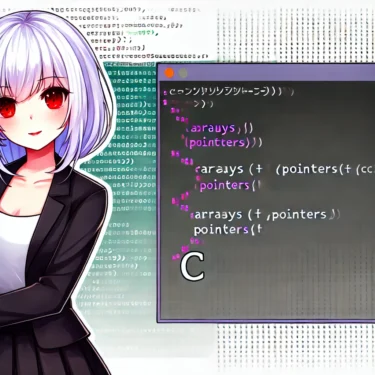- 1 1. Introduction
- 2 2. What Are Logical Operators? (Basics in C)
- 3 3. Main Logical Operators in C and How to Use Them
- 4 4. Operator Precedence and Associativity
- 5 5. Practical Examples: Using Logical Operators in Conditionals and Loops
- 6 6. Difference Between Logical and Bitwise Operators
- 7 7. Common Mistakes and Precautions
- 8 8. FAQ: Frequently Asked Questions About Logical Operators
- 9 9. Summary
1. Introduction
C is a simple yet powerful programming language that forms the foundation of many other languages. Among its many features, logical operators play an important role in tasks such as conditional evaluation and loops. By understanding logical operators correctly, you can easily construct complex conditional branches and greatly improve code efficiency.
In this article, we will explain C language logical operators in detail, covering their characteristics, usage, and practical examples. In addition to mastering the basic logical operators such as the AND and OR operators, we will also discuss the differences between logical and bitwise operators, as well as common pitfalls.
Through the content you are about to learn, you will deepen your understanding of C logical operators and acquire skills that will be useful in real-world programming.
2. What Are Logical Operators? (Basics in C)
In C, logical operators are primarily used to evaluate the truth or falsity of conditions in statements and loops. They determine whether a condition is true or false and execute code accordingly. By using logical operators, you can combine multiple conditions, invert them, and increase the flexibility of your programs.
Roles and Uses of Logical Operators
There are three main logical operators in C, each used for different purposes:
- Logical AND Operator:
&&
- Evaluates to true only if both conditions are true. Used in cases where the next process should only proceed if both conditions are satisfied.
- Logical OR Operator:
||
- Evaluates to true if at least one condition is true. Used when you want to proceed if either one of the conditions is met.
- Logical NOT Operator:
!
- Inverts the truth value of a condition. If the condition is true, it becomes false, and vice versa.
Logical operators can be embedded into conditional expressions such as if statements and while loops, giving you fine control over program flow. When used effectively, they allow complex branching to be expressed in a concise way.
Basic Syntax of Logical Operators
Logical operators are generally written as follows:
if (condition1 && condition2) {
// Executes if both condition1 and condition2 are true
}
if (condition1 || condition2) {
// Executes if either condition1 or condition2 is true
}
if (!condition) {
// Executes if condition is false
}When to Use Logical Operators
Logical operators are particularly useful when combining multiple conditions. For example, if you want to process only people who are at least 20 years old and at least 160 cm tall, you can use the AND operator to evaluate both conditions at the same time.
Understanding and using logical operators is the first step toward writing effective conditional statements in C. In the next section, we will look at concrete examples of how to use them.
3. Main Logical Operators in C and How to Use Them
The three most commonly used logical operators in C are AND (&&), OR (||), and NOT (!). Each is used to evaluate conditions in different ways. Let’s go through each operator with examples.
3.1 Logical AND Operator: &&
The logical AND operator (&&) returns true only if both conditions are true. It’s useful when you want the code to run only when all specified conditions are met.
Example
#include <stdio.h>
int main() {
int age = 25;
int height = 170;
if (age >= 20 && height >= 160) {
printf("Conditions met.\n");
} else {
printf("Conditions not met.\n");
}
return 0;
}Explanation
In this example, the message “Conditions met.” will be displayed only if age is 20 or older and height is 160 cm or taller. If either condition fails, “Conditions not met.” will be printed.
3.2 Logical OR Operator: ||
The logical OR operator (||) returns true if at least one condition is true. It’s useful when you want the code to run if any one of the specified conditions is met.
Example
#include <stdio.h>
int main() {
int age = 18;
int student = 1; // 1 indicates "is a student"
if (age >= 20 || student == 1) {
printf("Discount applies.\n");
} else {
printf("No discount.\n");
}
return 0;
}Explanation
Here, “Discount applies.” will be printed if the age is 20 or older or if student is 1. Only when both conditions fail will “No discount.” be displayed.
3.3 Logical NOT Operator: !
The logical NOT operator (!) inverts the truth value of a condition. If the condition is true, it becomes false, and vice versa. It’s often used when you want to perform an action if a condition is not met.
Example
#include <stdio.h>
int main() {
int registered = 0; // 0 means "not registered"
if (!registered) {
printf("User is not registered.\n");
} else {
printf("User is registered.\n");
}
return 0;
}Explanation
Since registered is 0 (false), !registered evaluates to true, so “User is not registered.” is printed. If registered were 1, the output would be “User is registered.”
3.4 Summary of Logical Operator Use Cases
Logical operators are extremely helpful for combining multiple conditions in your code. They allow you to write concise yet expressive conditional statements. By combining AND, OR, and NOT, you can create flexible and precise condition checks.
4. Operator Precedence and Associativity
In C, complex conditions often involve multiple operators. Without understanding operator precedence and associativity, you might get unexpected results. This section explains how logical operators are prioritized and evaluated.
4.1 Precedence of Logical Operators
From highest to lowest precedence:
- Logical NOT (
!) - Logical AND (
&&) - Logical OR (
||)
When multiple logical operators are present in one expression, evaluation order is ! → && → ||.
Example:
#include <stdio.h>
int main() {
int a = 1;
int b = 0;
int c = 1;
if (!a || b && c) {
printf("Condition is true.\n");
} else {
printf("Condition is false.\n");
}
return 0;
}Explanation
First, !a is evaluated (since a is 1, !a becomes 0). Next, b && c is evaluated (since b is 0, the result is 0). Finally, 0 || 0 is false, so “Condition is false.” is printed.
4.2 Associativity
- Logical NOT (
!) is evaluated right-to-left. - Logical AND (
&&) is evaluated left-to-right. - Logical OR (
||) is evaluated left-to-right.
If operators of the same precedence appear in sequence, evaluation follows the associativity rules.
4.3 Using Precedence and Associativity for Correct Evaluation
When working with complex conditional expressions, it’s important to be aware of operator precedence and associativity to avoid unintended results. In many cases, adding parentheses () to make the evaluation order explicit will make the code more readable and less error-prone.
Example:
#include <stdio.h>
int main() {
int a = 1;
int b = 0;
int c = 1;
if ((a || b) && c) {
printf("Condition is true.\n");
} else {
printf("Condition is false.\n");
}
return 0;
}Explanation
Here, parentheses ensure that a || b is evaluated first. Since a is 1, the result is true. Then, true && c is evaluated, and since c is also true, the overall condition evaluates to true.
4.4 Key Points About Operator Precedence
- Use parentheses proactively in complex conditions to make the intended order clear.
- Parentheses improve readability and help prevent misunderstandings about precedence.
- When debugging, test each part of the condition separately to verify that the evaluation matches your expectations.
5. Practical Examples: Using Logical Operators in Conditionals and Loops
Logical operators in C are essential for controlling program behavior. They are particularly powerful when used with if statements and loops, allowing you to define precise execution conditions.
5.1 Conditional Branching with if Statements
By combining multiple conditions using logical operators, you can create flexible branching logic. For example, checking whether a user meets both an age requirement and a membership status.
#include <stdio.h>
int main() {
int age = 22;
int is_member = 1; // 1 means "is a member"
if (age >= 18 && is_member == 1) {
printf("You can use the service.\n");
} else {
printf("You cannot use the service.\n");
}
return 0;
}5.2 Conditional Branching with OR Logic
OR logic is useful when you want the condition to pass if at least one requirement is met.
#include <stdio.h>
int main() {
int age = 20;
int is_student = 1;
if (age >= 65 || is_student == 1) {
printf("Discount applies.\n");
} else {
printf("No discount.\n");
}
return 0;
}5.3 Using Logical Operators in Loops
In loops, logical operators can control the continuation based on multiple conditions.
#include <stdio.h>
int main() {
int count = 0;
int limit = 5;
while (count < limit && count != 3) {
printf("Count: %d\n", count);
count++;
}
printf("Loop ended.\n");
return 0;
}5.4 Combining Multiple Logical Operators
You can mix AND and OR to handle more complex conditions.
#include <stdio.h>
int main() {
int age = 30;
int income = 500000;
int is_member = 1;
if ((age > 25 && income >= 300000) || is_member == 1) {
printf("Benefit applies.\n");
} else {
printf("Benefit does not apply.\n");
}
return 0;
}5.5 Summary: Logical Operators in Conditionals and Loops
Logical operators make it easy to combine conditions and control the program flow effectively. By mastering AND, OR, and NOT in various scenarios, you can write cleaner, more maintainable code.
6. Difference Between Logical and Bitwise Operators
Logical and bitwise operators in C may look similar but work differently. Beginners often confuse them, especially && vs. & and || vs. |. Understanding the difference is essential.
6.1 Basic Differences
- Logical Operators (
&&,||,!): Evaluate true or false based on conditions; used for control flow. - Bitwise Operators (
&,|,~,^): Operate on each bit of integer values; used for low-level data manipulation.
6.2 Logical AND vs. Bitwise AND
#include <stdio.h>
int main() {
int a = 6; // binary 0110
int b = 3; // binary 0011
if (a && b) {
printf("Logical AND: condition is true.\n");
}
int result = a & b;
printf("Bitwise AND result: %d\n", result); // 2 (binary 0010)
return 0;
}6.3 Logical OR vs. Bitwise OR
#include <stdio.h>
int main() {
int a = 6; // binary 0110
int b = 3; // binary 0011
if (a || b) {
printf("Logical OR: condition is true.\n");
}
int result = a | b;
printf("Bitwise OR result: %d\n", result); // 7 (binary 0111)
return 0;
}6.4 Practical Uses of Bitwise Operators
Bitwise operations are often used in low-level programming, such as working with hardware registers, masks, and flags.
6.5 Tips to Avoid Confusion
- Use
&&and||for condition checking; use&and|for bit manipulation. - Be careful not to use bitwise operators in conditionals unless explicitly intended.
7. Common Mistakes and Precautions
Logical operators in C are convenient for evaluating conditions, but misunderstanding or misuse can cause unintended behavior. Here are common mistakes and how to avoid them.
7.1 Confusing Logical and Bitwise Operators
One of the most frequent mistakes is mixing up logical operators (&&, ||) with bitwise operators (&, |).
Example:
#include <stdio.h>
int main() {
int a = 1; // true
int b = 0; // false
// Incorrect: should use && instead of &
if (a & b) {
printf("Condition is true.\n");
} else {
printf("Condition is false.\n");
}
return 0;
}Explanation
Here, a & b performs a bitwise AND, not a logical AND. The correct approach is if (a && b) for evaluating true/false conditions.
7.2 Using Assignment (=) Instead of Comparison (==)
Another common error is using the assignment operator inside a condition instead of the comparison operator.
Example:
#include <stdio.h>
int main() {
int a = 5;
// Mistake: using = instead of ==
if (a = 0) {
printf("a is 0.\n");
} else {
printf("a is not 0.\n");
}
return 0;
}Explanation
This code assigns 0 to a instead of comparing it. Always use == for comparisons in conditions.
7.3 Ignoring Operator Precedence
Failing to consider precedence in complex conditions can produce incorrect results. Use parentheses to ensure the intended evaluation order.
7.4 Not Understanding Short-Circuit Evaluation
Logical operators use short-circuit evaluation:
&&: If the first condition is false, the rest are not evaluated.||: If the first condition is true, the rest are not evaluated.
Example:
#include <stdio.h>
int main() {
int a = 0;
int b = 5;
if (a && (b++ > 0)) {
printf("Condition is true.\n");
} else {
printf("Condition is false.\n");
}
printf("Value of b: %d\n", b);
return 0;
}Explanation
Since a is false, b++ is never executed, and b remains 5.
7.5 Summary of Common Mistakes
- Do not confuse logical and bitwise operators.
- Use
==for comparison, not=. - Use parentheses to clarify precedence.
- Be aware of short-circuit behavior when conditions include side effects.
8. FAQ: Frequently Asked Questions About Logical Operators
Q1. How do I combine multiple conditions in C?
Use && for AND and || for OR. For example:
if (age >= 18 && is_student == 1) {
// Both conditions must be true
}Q2. What’s the difference between logical and bitwise operators?
Logical operators evaluate true/false, while bitwise operators work at the binary level on integers.
Q3. How can I remember operator precedence?
The order is: ! (highest) → && → ||. If unsure, use parentheses.
Q4. What is short-circuit evaluation?
It’s when logical operators skip evaluating the rest of a condition if the result is already determined by the first operand.
Q5. What happens if I use = instead of == in an if?
The value will be assigned instead of compared, potentially causing logic errors.
9. Summary
In this article, we covered the fundamentals of logical operators in C:
- Three main operators: AND (
&&), OR (||), NOT (!). - Operator precedence:
!>&&>||. - Combining conditions for flexible branching and loops.
- Difference between logical and bitwise operators.
- Common mistakes and how to avoid them.
Understanding and correctly applying logical operators will allow you to write more efficient, readable, and reliable C programs.



